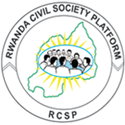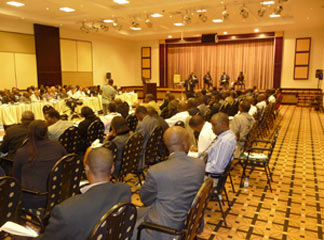1. Introduction
Rwanda Members of the Civil Society organizations should work closely with the Government and other stakeholders to help ensure smooth and faster regional integration with the rest of the East African Community (EAC) actors. There are existing regulatory frameworks, Heads of State Directives and Council Decisions that were adopted to facilitate citizen engagement in EAC Integration.
Rwandan CSOs have closer interactions with citizens and link them the government through advocacy making them a critical element to involve in EAC activities and in smooth and faster integration process which is also part of our 5 Year Strategic Plan and Consultative Dialogue Framework provided in EAC Treaty. Unlike the previous EAC that collapsed in 1977, there is need for citizen’s involvement and this can easily be done through members of Rwanda civil society organizations playing an active role in EAC integration agenda.
The involvement of the Rwanda civil society platform and its member CSOs will boost good governance, fast-track development, fight poverty among citizens as well improve service delivery, and bring potential benefits of EAC integration closer to Rwandans.
While EAC today is celebrating 20 years anniversary, Rwanda CSOs are taking a proactive role in working with Government especially the Ministry responsible for EAC Affairs in Rwanda and other EAC Organs, Institutions like, EAC Secretariat, East African Legislative Assembly, and other East African Civil Society organizations to make EAC Integration agenda sustainable and relevant to EAC nationals.
Rwanda Civil Society Organizations should have an active and full participation and ownership of activities relating to Rwanda’s trade with EAC, operationalization of Single Customs Territory, One Area Network, One Stop Border Post, Use of Identity Card as a travel document, elimination of Non -Tariff Barriers, implementation of East African Single Tourist Visa, air space management, application of common external tarrif, harmonization of standards and quality assurance, mutual recognition Agreements among professional bodies like Architects, Accounting services, veterinary services, Engineering services, Financial mobile services and interoperability of services, Environment and natural resources management, agriculture and food security among others during the design, monitoring and advocacy on policies, programmes and laws.
2. Rationale
The National dialogue will bring CSOs, Private Sector and Government representatives to discuss among others Effective Citizen and CSOs participation in industrialization agenda- Consultation and engagement arrangements, Benefits/value addition to local economies, Supportive legal and policy framework, engagement of vulnerable groups/people- women, youth and other specific groups.
In a people-centered society, the importance of CSOs lies in their ability to bridge the gap between the state and the citizen. Research has shown that both the state and citizens benefit when a dense web of CSOs work to mediate this relationship. This benefit however is not only confined to the national level; the work of CSOs is increasingly beginning to extend far beyond national borders and has the capacity to yield even greater results when allowed to operate across country borders.
Rwanda Civil Society Platform and its member CSOs should work to stimulate the participation of the ordinary persons in Regional Integration by enhancing their rights and advocating for sustainable development in the bigger EAC.
RCSP and members should be able to advocate at the regional level for sound policies and programs on behalf of the Rwandan citizens as well as to promote citizens awareness on EAC benefits and participation in EAC matters.
Under the existing arrangement of Civil Society Dialogue framework(CDF) that was approved by EAC Council of Ministers way back in 2012, the Rwanda Civil Society Platform together with its members wishes to engage other stakeholders both the public and Private Sector for a series of dialogues across East Africa so as to raise the civic voices on all Rwanda –EAC areas of cooperation ranging from cooperation in Trade matters, infrastructure development, education, ICT, Financial sector, political matters, standards harmonization, creation of a single market among others.
It is within above context that RCSP is organizing a national dialogue on EAC integration
3. Objectives of National dialogue on EAC Integration agenda
The general objective is bringing EAC Integration closer to Rwandan citizens, raising the civic voice and influencing EAC integration policies and practices in all areas of Rwanda’s cooperation with EAC for the purposes of benefiting from the projects and programmes designed to benefit citizens.
Specific objectives include
- To raise awareness on EAC integration agenda to CSOs in Rwanda through Consultative dialogue framework as spelt in the EAC Treaty
- To increase Rwanda CSO and private sector to positively influence decisions taken on EAC projects and programmes and embrace potential benefits
- Taking stock of current EAC achievements, challenges, lessons and best practices as we celebrate its 20 the Anniversary
- Generate views in an issue paper as recommendations to the Ministry in charge of EAC affairs and subsequently to EAC Secretariat
4. Expected outcomes
- Rwandan CSOs understand their role in EAC agenda while operationalizing already adopted EAC Civil Society Dialogue Framework.
- Increased understanding and partnership between Civil Society, Private Sector and Government Ministries in the matters of EAC integration projects and their voice considered throughout regional processes
- EAC member States’ achievements, challenges, best practices and recommendations to be considered while celebrating 20 years of its revival are discussed
- Strategies of CSOs to engage in EAC Integration and awareness of EAC projects and programs to the citizens by making them understand potential benefits and how to access these benefits are discussed.
- CSOs Position paper is produced to be to be shared with the Ministry in charge of EAC affairs, other relevant institutions and EAC Secretariat
5. Methodology
a. Preparation of issue paper on how to address competitiveness to address doing business in EAC and how potentially affect the lives of Rwandan Citizens, this issue paper will be the basis for our discussions
b. Panel discussion by CSOs, PSF and Government (MINAFFET) on strengthening partnerships around regional integration agenda followed by plenary discussion from participants.
c. Prepare Rwanda’s position paper to actively engage during Secretary General Forum and later to EAC Council of Ministers
d. Views from participants are integrated to inform position paper for CSOs to be shared concerned stakeholders.
6. Participants
This dialogue will attract members of Civil Society Organizations, Private Sector, Development Partners and Government representatives.
7. Venue and Date
This dialogue is expected to take place at Gorillas Golf Hotel on 26th June, 2019 starting 8:30 am – 1 pm





